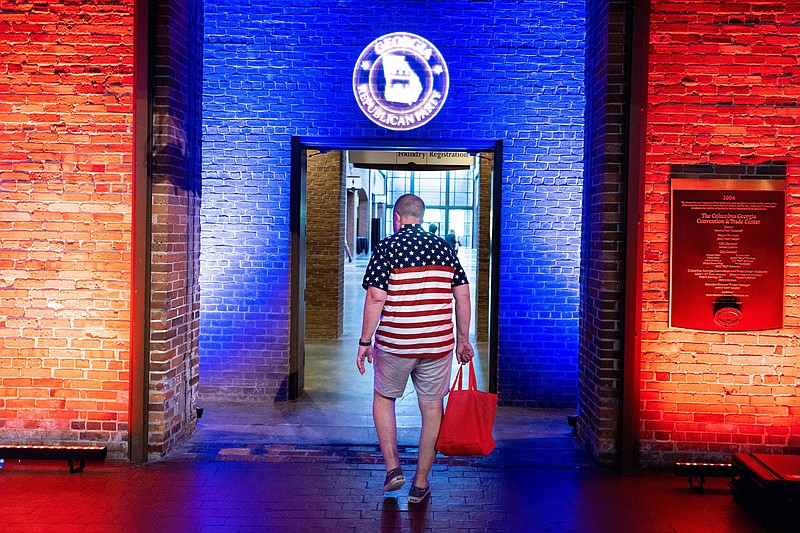ROME, Ga. — A few weeks ago, three incumbent Republican County Commission candidates and a former County Commission chair filed into a Catoosa County office to qualify for the GOP ticket.
To their surprise, local party officials rejected each of them, citing a controversial new rule pushed by a far-right faction designed to block people they deem “traitors” from running as Republicans.
Their fight to get on the ballot in the deep-red county triggered a political and legal standoff that landed in federal court Wednesday, where a judge could soon decide on the merits of the policy.
And while it might seem like a parochial battle, the outcome could have big consequences in the ongoing campaign by ultraconservatives who want to purge the party of more moderate or mainstream Republicans.
The group crusading for the new rules, the Georgia Republican Assembly, unsuccessfully pushed last year for policies that could have given the Georgia GOP the final say over who can run as Republicans for governor, legislative seats and other state offices.
The organization vilifies Gov. Brian Kemp and other state incumbents who rejected then-President Donald Trump’s demands to overturn his 2020 defeat, and it has targeted legislative leaders deemed unworthy of the party’s brand.
But the movement has gained more traction in smaller, conservative counties, where most races for commission seats and other local offices are decided in GOP primaries. (In Georgia, the two major political parties handle the process for candidates to qualify for office.)
Already, GOP hard-liners in Catoosa and at least three other Georgia counties have adopted similar rules that give party leaders — and not voters — the final say over who can run as Republicans.
And Catoosa has become the epicenter of the fight since party leaders became the first to use their new authority to block local Republicans from running.
‘Share our values’
That’s what happened in March to County Commission Chair Larry Black, Commissioners Jeff Long and Vanita Hollander, and former Commission Chair Steven Henry when each tried to qualify as a Republican.
All four had previously won their seats running as Republicans in Catoosa, a county of about 70,000 along the Tennessee border so conservative that even many Democrats vote in the GOP primary.
Local activists point to a hodgepodge of issues for the rejection, including votes on tax and development policies, along with an uproar over Henry’s decision to oust a critic from a 2021 commission meeting.
Superior Court Judge Don Thompson ultimately ordered the Catoosa election board to allow the four to qualify, and he threatened to slap a major fine on the Catoosa GOP if it doesn’t heed his order.
The party appealed the ruling and filed a separate lawsuit asking a federal judge to block the election board from qualifying the quartet as GOP candidates, saying Republicans would be “significantly harmed” if the four won election as Republicans.
As Catoosa GOP Chair Joanna Hildreth puts it, the policy ensures that Republicans who “share our values” are on the ballot.
“Too often, voters are rightfully disappointed by candidates who run with ‘Republican’ by their name only to abandon the platform once elected, if they ever really supported it to begin with,” she said.
But opponents — and there are many, even among ardent conservatives — warn that such policies entrust too much power in the hands of a few activists.
Bryan Tyson, an elections law expert who represents Henry in a separate state challenge, said a Catoosa GOP victory could change the face of politics in Georgia.
“If they are right about the law on this, it means the state party can control who runs for governor and other state races, and the county party can control who runs for county offices,” he said.
“That would outsource the power from the voters to the party,” he added. “The party could pick just one candidate for each position, and that would be it.”
‘Voters really decide’
The hearing on Wednesday was rife with such hypotheticals as U.S. District Judge Billy Ray wrestled with the implications of the dispute.
No stranger to politics, Ray reminded the packed courtroom that he was the Gwinnett County GOP chair and a longtime Republican state senator before he was appointed to a superior court judgeship in 2002. In 2018, Trump elevated him to the federal bench.
Ray seemed amenable to arguments from Christopher Harris, an attorney for the local election board, who said the federal judge should abstain from the case because two other state court proceedings involving the same issues are still pending.
Harris also argued it was too late in the process to remove the quartet from the GOP ticket. The May 21 primary is weeks away, overseas and military ballots have already been sent out, and mail-in votes will soon be streaming into the election office.
But Ray also explored the more substantive consequences of the rule change. He pressed Alex Johnson, a Georgia Republican Assembly leader who represents the Catoosa GOP, on the potential implications of his policy.
“The party’s brand is significantly damaged when someone manages to get an ‘R’ by their name when they are not actually a Republican,” Johnson said.
Ray, who didn’t issue an immediate ruling, then asked whether Johnson considered an alternative interpretation of what constitutes a Republican.
“At the end of the day, the Republican Party is who shows up to vote,” the judge said. He then questioned whether Johnson agreed with this notion:
“Voters really decide who is a Republican on election day.”
